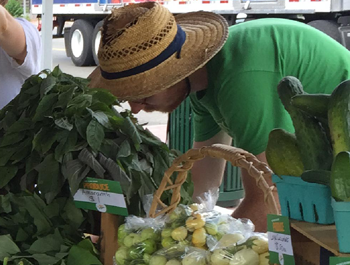Image

Adeline Newbold, Community Building and Organizing Manager, West Elmwood Housing Development Corporation
Challenge: Providence's West End neighborhood, a culturally and economically diverse community, is populated by mostly low-income and moderate-income households, over 38 percent of whom are immigrants. Access to healthy food, social services and support was limited until West Elmwood Housing Development Corporation and its partners addressed issues in the neighborhood.
The West End, a mixed industrial and residential neighborhood, in Providence, RI, has been in decline since the 1950s when numerous large industries closed their doors, leaving unemployment and blight in their wake. Today, over 38 percent of residents were born outside the United States, 32 percent fall below the poverty line and 62 percent say they have to choose between paying for housing or buying food. When they moved into the neighborhood, many of these relocated families, mostly from Central America, West Africa and Southeast Asia, began suffering from health problems due to the lack of fresh fruits and vegetables. They couldn't grow their own food and what was available was too expensive or required long treks outside the neighborhood. These newcomers were also concerned about the lack of social services and support they found in their adopted communities.
West Elmwood Housing Development Corporation (WEHDC) was founded in the 1970s by residents seeking to improve housing conditions and homeownership opportunities. Our mission is to develop healthy, sustainable communities through affordable housing and other services to West End residents. In 2011, community leaders, stakeholders, academic partners and nutrition and gardening experts joined us in the search for a response to residents' concerns about access to healthy food.
The Rhode Island Department of Health awarded us a three-year grant in 2013 to delve deeper in understanding the neighborhood's multicultural food narrative. We used a detailed, grassroots approach to data collection, conducting interviews and focus groups in the subjects' homes or other familiar surroundings such as churches and sporting events. The surveys were often in the subjects' preferred language.
 These studies found high levels of obesity, diabetes and other diet-related health problems. Residents wanted better access to healthy fruits and vegetables and land to grow the foods they had back home. Safe, quality affordable housing was also in high demand.
These studies found high levels of obesity, diabetes and other diet-related health problems. Residents wanted better access to healthy fruits and vegetables and land to grow the foods they had back home. Safe, quality affordable housing was also in high demand.What emerged was a multifaceted plan to transform blighted properties, provide culturally appropriate, fresh locally produced food; expand economic opportunities and strengthen a sense of community among West End residents. The initiative was named Sankofa, which means "to go back and fetch it" in Ghana's Twi language. The expression embraces the importance of learning from the past to make positive changes for the future.
The multiphase Sankofa Initiative includes a community garden and farm where residents can grow their own food and a market where the farmers and local entrepreneurs can sell produce and crafts. A greenhouse allows growers to extend their season and increase the diversity of their produce. The community kitchen provides a facility for food preparation, nutrition and wellness training. The recent closing of the Women, Infants, and Children (WIC) centers left the West End without a federal nutrition supplemental program for mothers and their children. The Sankofa WIC center will reconnect pre and post-natal women and their children to healthy, affordable, local food and provide on-site nutrition education. In addition, 50 housing units built on 10 previously blighted lots throughout the West End will revitalize the neighborhood and provide shelter for low-income residents.
The Sankofa World Market opened in 2014 and had more than 2,400 shoppers in 2015. The public outdoor marketplace brings together residents from the West End and other communities to enjoy affordable, fresh and culturally relevant food. Music, cooking classes and tastings are often held at the market, which also draws craftspeople, artists and other entrepreneurs.
The Sankofa Initiative significantly strengthened our partnership with the city's leader in urban agriculture, Southside Community Land Trust (SCLT), whose grower training program offers an experiential learning opportunity at the market.
For example, Ms. K, a refugee from the Liberian Civil War, brought considerable agricultural skills to her new home. She struggled to support her family and wanted to grow food and develop a farming business that would contribute to the household she shared with her daughter and grandson. Ms. K couldn't find space for growing or selling produce at existing farmers' markets until SCLT provided grower training for Ms. K and other beginning farmers, as well as a table at the market that she shared with two other sellers. The enterprise allows Ms K. to increase her productivity and expand her skills in selling the vegetables most in demand in the African community, such as potato greens and bitter eggplant. She keeps a portion of her crops for her family and her profits go toward her family's financial security.
The Sankofa Initiative's continued development will increase the availability of fresh, healthy, affordable and culturally appropriate food and connect more residents with the opportunity to grow, purchase and share in the community process of cooking and eating. Through this project, we learned:
- The importance of grassroots data collection in the planning and ongoing development of any community initiative.
- Making the most of a community members' resources, such as farming experience, will produce a more effective outcome and increase community engagement.
- Working with partners with similar needs and goals yields more holistic benefits.

